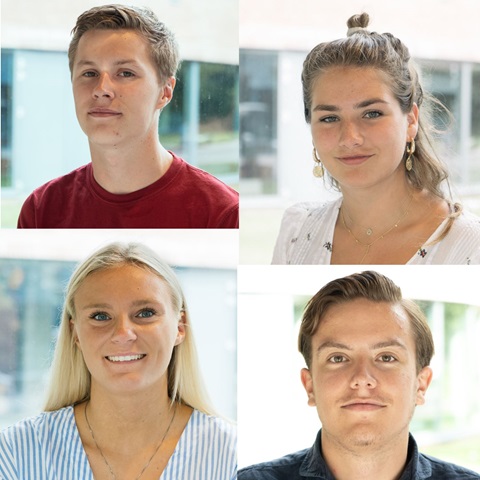Tiny housing and bio-based construction; seemingly the logic answer to the question how to protect our climate and simultaneously achieve the current construction goals. The subject remains the topic of conversation though. To four progressive students of BSc in Business Administration, Hanna Cohen Jehoram, Dylan Quatfass, Annique Pallesen Ultee and Ole Nijst, this was the trigger to start doing research during their second study year for the subject The Company Project and to consult about the shortage of sustainable and compact houses.
Partly due to the crisis, finding a project wasn’t easy. But the students remained positive. “During the startup phase we received various rejections. This wasn’t always fun to hear, but it also teaches you quickly how to put things in perspective”, explains Hanna. “Organizations often think that a project takes up a lot of time in comparison to the achieved result, but the project can also turn out to be a success”, adds Annique.
Minitopia
Tiny houses are smart, energy-efficient homes with a maximum floor space of 50 square meters. Residents of these houses are looking to enjoy a dynamic way of life in which the community feeling plays a major role. The students recognized opportunities and got in touch with Rezone, initiator of the tiny housing project ‘Minitopia’. This project started in 2016 in the vicinity of 's-Hertogenbosch, and in the meantime Utrecht and The Hague have joined as well. The core message stays the same; realizing your own home in freedom.
A sustainable cooperation
The theme was a conscious choice for the group. “I have my roots in Norway, where they have more experience with sustainable housing solutions”, explains Annique. Hanna is also interested in sustainability and wants to further explore this theme after her graduation. Ole and Dylan feel more affinity towards the financial aspects. “Because we all have our own specialties, we really complement each other”, says Dylan.
Lecturer and coach Rob Berting coached the students during the project. “This project is an example of the unique aspect of Nyenrode. A roller coaster of experiences which helps shape the personal development of students. It is wonderful to help co-create a result which brings attention to this tiny housing project from every point of view. The many target groups for tiny houses, stakeholders such as banks, sustainable housing projects, municipalities, everyone looks at the project from their own perspective. This group of students delivers a complete overview and a workable solution in a time when many people have a hard time finding a home due to the housing shortage.”
 Financial reluctance
Financial reluctance
Even though the development of tiny houses is on the rise, banks and mortgage lenders remain reluctant. Especially the risk of a mobile house weighs heavily on the decision to not provide a loan. “There is a significant housing shortage and house prices are rising drastically. Developing compact homes can be a great bridge to solve the problem”, explains Dylan. "But especially because banks want to build in security and look at such projects as a risk, the current loan system is not suitable for future tiny house-owners”, adds Ole.
Many tiny house-owners therefore borrow money from family and friends or take out a consumer loan. The disadvantage of such a consumer loan is the higher interest rate, which makes it less attractive. Dylan and Ole have researched a hybrid form of borrowing, or a so-called tailor-made loan. Because the municipalities make the land available for a certain period, the loan can be taken out at a lower interest rate. This gives tiny house-owners more financial room to build a home to their liking. “If one sheep leaps over the ditch…” laugh Ole and Dylan.
Customized advice
The students’ final goal is the development of a ready-to-go sustainable package, which does not only provide future home owners with the information for sustainable construction, but also offers financial advantages to actually make it happen. “We have the will, but not all the necessary know-how just yet. By creating opportunities out of prejudices, there is no reason left to quit. Hotel Jakarta in Amsterdam, which is completely built from cross-laminated timber, is the perfect example for us that we can realize this together”, according to Hanna.
The students respond enthusiastically to the question whether they would want to live in a tiny house. “During your college years and the early years of your working career, it is a great and especially cheap solution. The crisis has also taught us that tiny houses are a very suitable alternative for working from home”, says Ole.
Social importance
The group is most proud of the bigger meaning of the project. “We thought that we started on something small, but eventually more and more parties have gotten involved”, says Annique. From governments and banks to construction companies and suppliers. It became quickly pretty clear to the students that the process of developing sustainable housing construction is complicated. Home owners are willing, but do not know how, finances form an obstacle and construction companies have other interests.
To the question whether the students would execute the project differently a next time around, the group remains silent for a second. “Yes, we would. In the beginning we wanted to have everything in place before even starting conversations with external parties. But we noticed that by having them join us we actually got a complete picture quicker”, explains Annique.
A sustainable future
The students agree on the future immediately. Ole: “At Nyenrode you make friends for life. This project has strengthened our connection. We remain involved and hope that the plan is picked up with enthusiasm.” They also do not rule out passing on the plan to the next group of first-year students.
The advice Hanna, Annique, Ole and Dylan want to give to other students, is to not be afraid to shock, to show the world where it is headed if you don’t take action and to make sure you have access to capital.
In short: Make tiny the next big thing!
Related programs
-
Bachelor in Business Administration (BSc)
Start date: Mid-August 2025Language:- English
Location:- Amsterdam
- Breukelen
Three-year full-time academic bachelor's in Amsterdam or Breukelen, including leadership development, international exchange and company projects. You can choose the location that fits you.
View program

